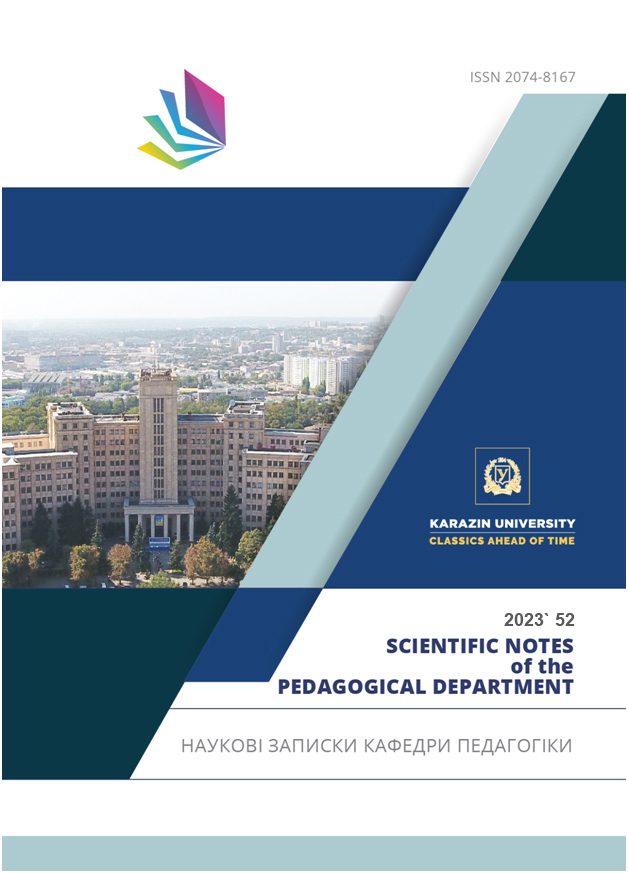Організація освітнього процесу майбутніх фахівців з графічного дизайну засобами цифрових технологій
Анотація
Сьогодні ми живемо в епоху глобальної цифровізації суспільства. Стрімкий розвиток технологій та цифровізація захоплює все більший спектр сфер діяльності людини, у тому числі освітні та твор- чі напрямки. Цифровізація переосмислює на глобальному рівні підходи до організації освітнього процесу, творчої та проектної діяльності. Цифрові технології слід розуміти як один з інструментів у дизайнерській діяльності в сучасному мистецтві, а також область для створення нематеріальних віртуальних продуктів.
Мета статті – висвітлити питання впливу цифрових технологій на організацію освітнього процесу фахівців з графічного дизайну.
Матеріали і методи. Для досягнення поставленої мети дослідження було використано комплекс теоретичних методів: аналіз та узагальнення науково-методичних джерел задля теоретичного
обґрунтування проблеми дослідження, моделювання, синтез отриманих даних.
Результати дослідження. Основна мета дизайн-освіти – це формування кваліфікованого фахівця, особистості, здатної освоювати культурний досвід та сучасні технології, у тому числі цифрові.
Дизайн є особливим видом діяльності, в якому повсюдно використовуються та розвиваються інноваційні методи проектних рішень та сучасні цифрові технології. Таким чином, рівень технологічного
розвитку та цифровізації сьогодні як ніколи стимулює розвиток та просування дизайн-освіти.
Цифровізація сприяє впровадженню в освітній процес вебінарів, відеоконференцій, вона змінила форму організації та вид, а також доступність освітніх навчальних матеріалів. У сучасній дизай-
нерській освіті все частіше використовуються інтерактивні медіаресурси та цифрові технології.
Як і в будь-якій системі, що розвивається, у цифровізації є ряд недоліків і переваг. З одного боку, розвиток цифровізації дає дизайнерам необмежене поле для творчості та роботи. З іншого,
з’являється низка проблем та складнощів. Наприклад, зміни форми організації роботи з аудиторією, включаючи особливості та відмінності фізичних об’єктів та їх цифрових копій, авторське право тощо.
Завантаження
Посилання
Blyznyuk, M. M. (2018). Pedagogical design as a modern didactic direction in the training of future artists.
International Scientific Journal Scientific Review, 4(47), 77-89. [in Ukrainan].
Boychuk, V., Umanets, V., & Fu, G. (2021). The use of information and communication technologies in the artistic and creative activity of the future teacher of artistic disciplines. Modern information technologies and innovative teaching methods in training specialists: methodology, theory, experience, problems, 5-13. [in Ukrainan].
Horban, L. V. (2021). Digital art as a path to STEAM professions. Innovative practices of scientific education: materials of the All-Ukrainian scientific and practical conference (Kyiv, December 8–11, 2021).–Kyiv: Institute of the Gifted Child of the National Academy of Sciences of Ukraine, 570 p., 123. [in Ukrainan].
Denysenko, S. M. (2015). Pedagogical design in the modern educational process. Bulletin of Zhytomyr Ivan Franko
State University, (3 (81)), 79-83. [in Ukrainan].
Dobroskok, I.I., Nalivayko, O.O., Rybalko, L.S., & Zhernovnikova, O.A. (2020). Implementation of digital resources in the process of training musician-pedagogues in educational institutions of the People’s Republic of China. Professional education: methodology, theory and technologies. Pereyaslav-Khmelnytskyi: SKD, Issue 12. P. 123–137. [in Ukrainan].
Zhernovnikova, O. A., Peretyaga, L. E., Kovtun, A. V., Korduban, M. V., Nalyvayko, O. O. & Nalyvayko, N. A. (2020).
Technology of formation of digital competence of future teachers by means of gamiϐication. Information technologies and teaching aids. Volume 75 (1). P. 170–185. [in Ukrainan].
Karpluk, S. O. (2019). Peculiarities of digitization of the educational process in higher education. Information and digital educational space of Ukraine: transformational processes and development prospects, 188-197. [in Ukrainan].
Kosheleva, O., Tsyselska, O., & Kravchuk, O. (2022). Organization of the educational process in institutions of higher education of the cultural and artistic proϐile under martial law. Perspectives and innovations of science, (6 (11)). [in Ukrainan].
Lupyak, D., & Lupyak, D. D. (2016). Application of modern computer technologies in the training of future specialists in graphic design. Modern information technologies and innovative teaching methods in training specialists: methodology, theory, experience, problems, (47), 209-218. [in Ukrainan].
Matvienko, O., & Tsyvin, M. (2020). Digitization: educational context. Bulletin of the Book Chamber, (11), 28-35. [in Ukrainan].
Orshansky, L. (2020). Modern requirements and features of professional training of future designers in institutions of higher education. Art education: content, technologies, management, (15), 43-56. [in Ukrainan].
Stolyarova, I. S., & Ctolyarov, V. O. (2022). «Composition» using digital graphic technologies, and improving the quality of training of art education specialists. In Digital Transformations of Modernity: Proceedings of the Multidisciplinary International Scientiϔic-Practical Conference (January 24, 2022. Coimbra, Portugal) (pp. 9-12). Publishing «REICST».[in Ukrainan].
Tolochko, S. V. (2021). Digital competence of teachers in the conditions of digitization of educational institutions and distance learning. Bulletin of the Chernihiv Collegium National University named after TG Shevchenko. Series: Pedagogical Sciences, 13(169), 28-35. [in Ukrainan].
Trygub, O. L. (2021). The use of technologies of the virtual educational environment in the conditions of distance learning of students majoring in «Design». PhD Thesis. [in Ukrainan].
Tulashvili, Yu. (2021). Training of specialists in higher education institutions in the realities of digital transformation. Modern information technologies and innovative teaching methods in training specialists: methodology, theory, experience, problems, 116-127. [in Ukrainan].
Bozkurt, A. (2020). Educational Technology Research Patterns in the Realm of The Digital Knowledge Age. Journal of Interactive Media in Education, 2020(1), pp. 1–17.
Fernández-Sanz, L., Gómez-Pérez, J., & Castillo-Martınez, A. (2017). “e-Skills Match: A framework for mapping and integrating the main skills, knowledge and competence standards and models for ICT occupations. Computer Standards & Interfaces,vol. 51,pp. 30-42.
Godin, V.V., Terekhova, A. (2021). Digitalization of Education: Models and Methods. International Journal of
Technology. Volume 12(7), pp. 1518-1528.
Gorghiu G., L.M. Gorghiu, & L. Pascale. (2018). Enriching the ICT competences of university students – a key factor for their success as future teachers. Journal of Science and Arts, 1, pp. 183-190.
Guàrdia, L., Clougher, D., Anderson, T., & Maina, M. Ideas for Transforming Higher Education: An Overview of
Ongoing Trends and Challenges. The International Review of Research in Open and Distributed Learning, Volume
(2), pp. 166–184

